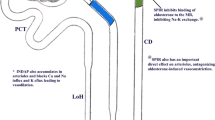Summary
The tablet formulation of diltiazem has been available for the treatment of angina pectoris but has not been comprehensively evaluated in hypertension. This study's aim was to evaluate the efficacy, dose-response characteristics, and duration of action of tablet (prompt-release) diltiazem in mild to moderate hypertension. Three placebocontrolled trials were designed. The first (trial #1) evaluated the dose response of 120, 240, and 360 mg/day (q12h regimen) of diltiazem in parallel fixed-dose fashion using hourly blood pressures. The second (trial #2) evaluated a q12h titration from 240 to 360 mg/day, which could be switched to q8h. The third (trial #3) evaluated a q8h titration from 180 to 270 to 360 mg/day, followed by conversion to a q12h regimen. The goal was a supine diastolic blood pressure of <90 mmHg and 10 mmHg less than baseline. With doses of diltiazem increasing from 120 to 240 to 360 mg/day, there was a progressive decrease in the average mean arterial pressure, describing a dose response with 120 mg/day as the ineffective dose. The peak effect for each dose regimen was found at 6 hours, with significant reductions lasting over 10 hours in the 240 mg/day and 360 mg/day groups. Peak plasma concentrations occurred at 3 hours. The residual effect at the trough of the 240 mg/day and 360 mg/day doses was 48% and 53% of the peak effect, respectively. When titration was carried out on a q8h regimen, both systolic and diastolic blood pressures were significantly decreased. When the regimen was switched from q8h to q12h, the effect was not maintained. Thus, the prompt-release preparation is not as effective as the sustained-release preparation in a q12h regimen, since it shows some loss of effect near the end of the 12-hour dosing period. However, the prompt-release preparation clearly produces adequate control of blood pressure in most patients in a q8h regimen.
Similar content being viewed by others
References
Pool PE, Seagren SC, Salel AF. Effects of diltiazem on serum lipids, exercise performance and blood pressure: Randomized, double-blind, placebo-controlled evaluation for systemic hypertension.Am J Cardiol 1985; 56:86H-91H.
Pool PE, Massie BM, Venkataraman K, et al. Diltiazem as monotherapy for systemic hypertension: A multicenter, randomized, placebo-controlled trial.Am J Cardiol 1986;57:212–217.
Frishman WH, Zawada ET, Smith LK, et al. Comparison of hydrochlorothiazide and sustained-release diltiazem for mild-to-moderate systemic hypertension.Am J Cardiol 1987;59:615–623.
Massie BM, MacCarthy EP, Ramanathan KB, et al. Diltiazem and propranolol in mild to moderate essential hypertension as monotherapy or with hydrochlorothiazide.Ann Intern Med 1987;107:150–157.
Weir MR, Josselson J, Giard M, et al. Sustained-release diltiazem compared with atenolol monotherapy for mild to moderate systemic hypertension.Am J Cardiol 1987;60:36I-41I.
Pool PE, Herron JM, Rosenblatt S, et al. Sustained-release diltiazem: Duration of antihypertensive effect.J Clin Pharmacol 1989;29:533–537.
Inouye IK, Massie BM, Benowitz N, et al. Antihypertensive therapy with diltiazem and comparison with hydrochlorothiazide.Am J Cardiol 1984;53:1588–1592.
Fleiss JL.The design and analysis of clinical experiments. New York: John Wiley & Sons, 1986:161–164, 176–178.
Weber MA. Evaluating the diagnosis and prognosis of hypertension by automated blood pressure monitoring: Outline of a symposium.Am Heart J 1988;116:1118–1123.
Sirgo MA, Mills RJ, DeQuattro V. Effects of antihypertensive agents on circadian blood pressure and heart rate patterns.Arch Intern Med 1988;148:2547–2552.
Author information
Authors and Affiliations
Consortia
Additional information
Supported in part by grants from Marion Laboratories, Kansas City, MO, USA.
Rights and permissions
About this article
Cite this article
Pool, P.E., Nappi, J.M., Weber, M.A. et al. Antihypertensive monotherapy with tablet (Prompt-release) diltiazem: Multicenter controlled trials. Cardiovasc Drug Ther 4, 1089–1096 (1990). https://doi.org/10.1007/BF01856504
Issue Date:
DOI: https://doi.org/10.1007/BF01856504




